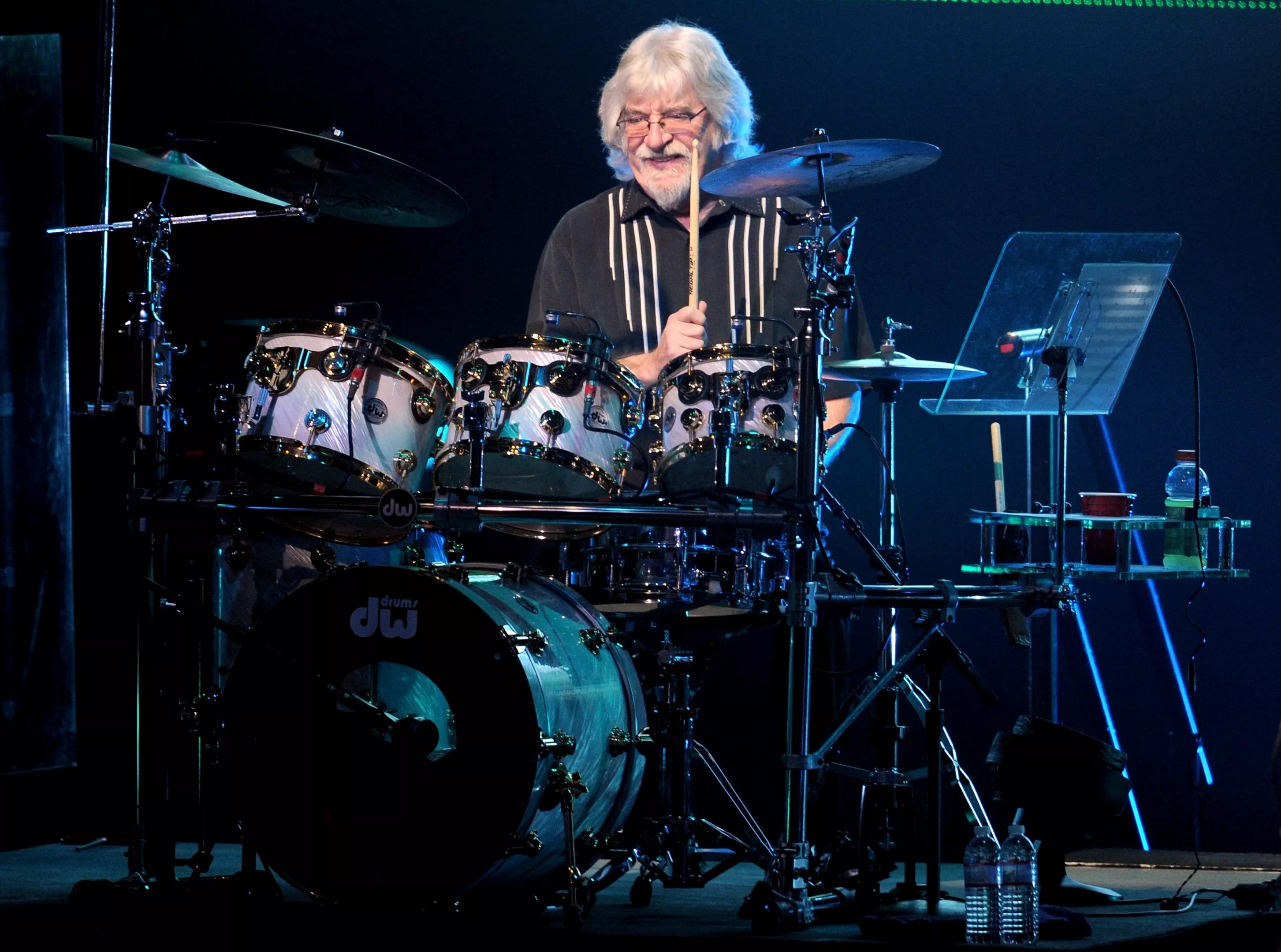
Kevin Winter/Getty

Audio By Carbonatix
Of all the bands in the 1960s that cracked open the colors of new musical possibilities, few are as underappreciated as The Moody Blues. The Moodies are widely beloved but taken for granted. They’ve had a crop of hit singles that still receive rotation on classic rock radio, but the band is seldom mentioned in the same breath as some of their less theatrical and more acclaimed peers.
Sure, The Beatles technically did it first, and bands such as Pink Floyd, Electric Light Orchestra and Deep Purple took it further, but The Moody Blues will always be able to lay claim to the fact that they were the first rock ‘n’ roll band to record an entire album piece with a full orchestra.
In many ways, it was all because of Graeme Edge.
The Moody Blues drummer, who died Nov. 11 at 80 years old (the same age as his iconic drumming contemporaries Charlie Watts and Ginger Baker), was the band’s driving force early on, expanding their sound past the fundamental rock-and-skiffle sound that many English bands were pursuing in the wake of Beatlemania.
Initially, The Moody Blues were an R&B-influenced Merseybeat act fronted by singer/guitarist Denny Laine (who later found great success as the cornerstone guitarist for Paul McCartney’s Wings). That incarnation yielded only one hit single, a cover of Bessie Banks’ “Go Now” in 1965, before the departures of Laine and bassist Clint Warwick the following year. Stepping in as guitarist and bassist, respectively, were Justin Hayward and John Lodge, who remained with the band since and are responsible for writing and singing the majority of The Moody Blues’ hit singles.
With Hayward and Lodge in the fold, the band was able to conceptually gel and begin writing material that required the assistance of the London Festival Orchestra, which became their landmark sophomore album Days of Future Passed – the first ever “orchestral rock” album.
Despite all that the band’s new lineup was able to contribute, it was Edge’s unlikely contribution that became their most defining feature: the poems. While Edge was trying to flesh out a song he was writing called “Morning Glory” for what would become Days of Future Passed, producer Tony Clarke convinced him that his lyrics would be better suited to poetry, and these poems went on to bookend the album – one part introducing the album and the second part (more famously) closing it, serving as the epilogue to the band’s magnum opus “Nights in White Satin”:
Breathe deep the gathering gloom
Watch lights fade from every room
Bed sitter people look back and lament
Another day’s useless energy spent
Impassioned lovers wrestle as one
Lonely man cries for love and has none
New mother picks up and suckles her son
Senior citizens wish they were young
Cold-hearted orb that rules the night
Removes the colors from our sight
Red is gray and yellow white
But we decide which is right
And which is an illusion
While actually recited by keyboardist Mike Pinder, Edge continued to contribute spoken-word poems (and entire songs) to the band’s next four consecutive records and beyond, going as far as serving as the punchline to the band’s cameo on The Simpsons in 1999.
Poetry aside, Graeme Edge was still a drummer first and foremost, and his adaptable style gave many of Hayward and Lodge’s compositions a sense of thrust and texture that placed him alongside many of the great rock drummers of the time. The thumping intro and unstoppable momentum of “I’m Just a Singer (In a Rock ‘n’ Roll Band),” the rhythm-cutting unorthodox fills on “Question,” the motorik steadiness of “Ride My See Saw,” and the almost imperceptibly subtle cymbal work and nocturnal mood of “Nights in White Satin” are just a few of Edge’s greatest drumming accomplishments.
Pinder’s departure in 1978 and flautist Ray Thomas’ retirement in 2001 and subsequent death in 2018 left Edge as the band’s sole original member still with the group.
In a statement regarding Edge’s death, Hayward acknowledged that The Moody Blues would not continue without their founding drummer, saying, “When Graeme told me he was retiring I knew that without him it couldn’t be the Moody Blues anymore. And that’s what happened. It’s true to say that he kept the group together throughout all the years, because he loved it.”
Here are 10 essential Moody Blues songs highlighting the drumming and songwriting of Graeme Edge:
“I’m Just a Singer (In a Rock ‘n’ Roll Band)” from Seventh Sojourn
“Nights in White Satin” from Days of Future Passed
“Question” from A Question of Balance
“Ride My See Saw” from In Search of the Lost Chord
“Higher and Higher” from To Our Children’s Children’s Children
“Beyond” from To Our Children’s Children’s Children
“The Balance” from A Question of Balance
“After You Came” from Every Good Boy Deserves Favour
“You and Me” from Seventh Sojourn
“22,000 Days” from Long Distance Voyager